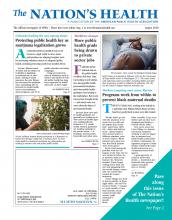College campuses around the world can gauge how well they are faring at taking actions on climate change, thanks to a toolkit from two undergraduate students at San Diego State University.
Spurred by a class project, San Diego State public health students Victoria Lawless and Christiana Yip took a United Nations toolkit designed for climate planning by cities and adapted it for use by college campuses. The student-created campus-level document earned an award from San Diego State University as well as input from the United Nations.
“Basically, we re-engineered the (U.N.) toolkit to make it usable on campus,” Yip told The Nation’s Health. “At the university level, we felt that there was a unique obligation, an opportunity, to address the problem one step lower than the broader city plan.”
The new campus-level document is based on a U.N. toolkit, “Guiding Principles for City Climate Action Planning,” a 2015 publication from the U.N. Human Settlements Program. The principles serve as a guide for cities as they work to reduce greenhouse gas emissions and adapt to the effects of climate change.
In 2016, Lemon Grove, California, became the first North American city to use the U.N. city-level toolkit, thanks to a partnership with San Diego State University’s Sage Project, which links communities and students together to address sustainability. Students in the Sage Project — including Yip and Lawless — worked with Lemon Grove officials to help them assess where they were in their climate action planning for the city.

Students Victoria Lawless, left, and Christiana Yip present their climate toolkit at San Diego State University. The students adapted a U.N. toolkit for cities for use on their campus.
Photo courtesy Victoria Lawless
The project was so successful that Lawless and Yip began looking for a new way to continue the work. The two consulted with their professor, Jessica Barlow, PhD, director of the Sage Project, deciding to bring the city-level toolkit to their university. Their plan was not to just downsize the U.N. plan, but also adapt it to the university environment.
“Universities are somewhat like small cities,” Barlow told The Nation’s Health. “It’s a huge number of people, but with no permanent residents. But then there’s the residents surrounding the campus. The problem becomes how do you define community? Who are your stakeholders?”
After over a year of work, presentations to agencies and schools and conference calls with the U.N., the first version of the campus-level climate action toolkit was finished in September. Beyond serving as a guide for carrying out a campus-level assessment, the toolkit calls on universities to integrate climate mitigation and adaptation into their curricula.
“We didn’t want to just make it applicable to schools in the California state university system,” Yip said. “We wanted to make sure that it was a global effort and that we are aiming to ensure the criteria are relevant to other areas that aren’t like ours.”
The campus-level toolkit is now in the dissemination phase. By distributing the plan to schools and presenting at conferences, organizers are seeking feedback before they release a second revision of the plan.
“We want students to be more aware on campus that climate change is very real and we want them to incorporate that into their careers and into their everyday life,” Lawless said.
“Making this a priority on the university-front is important to us and we think it should be more prominent throughout college campuses around the world.”
Lawless and Yip are both pursuing post-graduate study — Lawless, a master’s in public policy from the University of California San Diego and Yip a master’s in public health from the George Washington University.
For more information on “Guiding Principles for City Climate Action Planning: Toolkit for Campus-Level Review,” visit https://sustainable.sdsu.edu.
- Copyright The Nation’s Health, American Public Health Association









